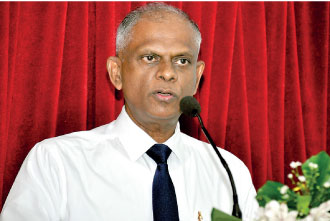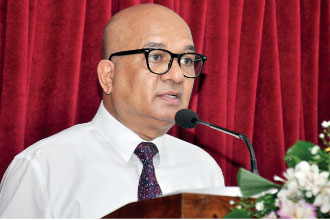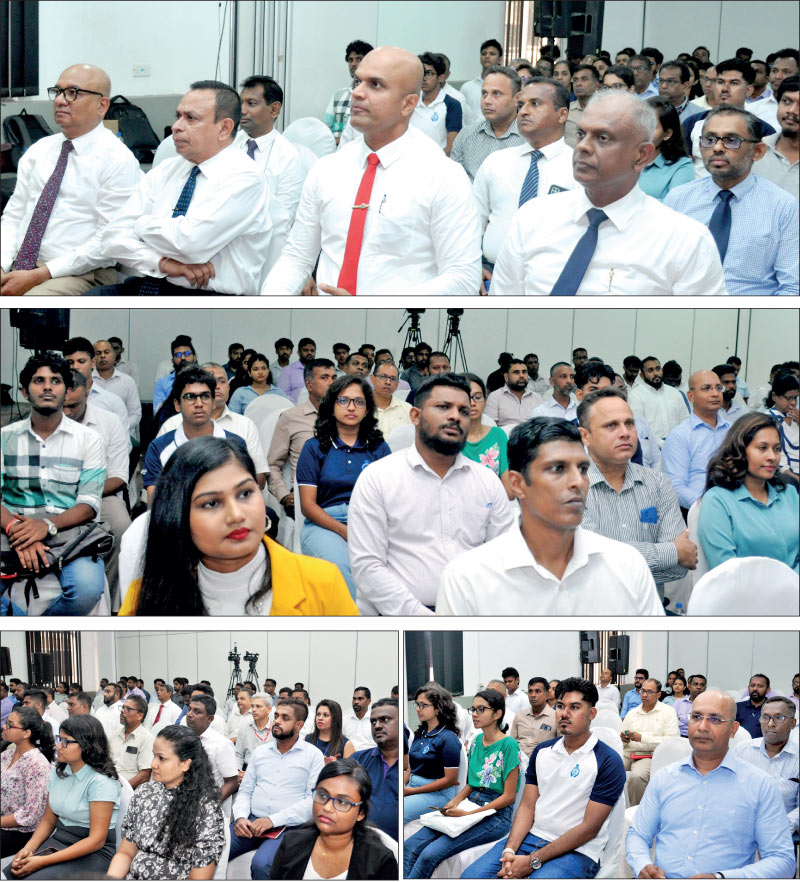Tuesday Feb 17, 2026
Tuesday Feb 17, 2026
Monday, 24 June 2024 00:10 - - {{hitsCtrl.values.hits}}
By Darshana Abayasingha
 |
| Customs Additional Director General Seevali P. Arukgoda |
 |
| Clearing and Forwarding Agents Association President Uvaiz Samsudeen
|
Sri Lanka Customs is increasing efficiency and revenue collection, and with rapid adoption of automation, is hoping to reduce corruption and offer greater control and visibility to traders.
The department is setting up an Internal Affairs unit to report and investigate complaints and allegations of corruption, and this unit will come into operation on Monday. The Internal Affairs unit at the Department of Customs has originated as part of proposals put forth by the IMF.
These details were shared by Sri Lanka Customs Additional Director General Seevali Arukgoda, who was speaking at a seminar on the ‘Risk of Non-Compliance and Liability due to Ignorance of Narcotics’, organised by the Association of Clearing and Forwarding Agents (ACFA) last week.
“We have identified several risks at Customs, and some of these include facilities, procedures, and corruption. Risk management is increasingly automated now, and we are also introducing a consignment management application, which will serve as a real-time dashboard of orders and operations. If anyone demands money saying a container is stuck due to whatever issue, you will have the facility to see if this is true and what inefficiencies are present. We are also launching the ASYHUB project to file customs declarations one month in advance, so goods can be cleared faster. We believe technology will minimise corruption and clear lots of issues in the system,” Arukgoda said.
He noted that Sri Lanka Customs achieved 109% of its revenue target for 2023, collecting Rs. 972 billion, and this was possible due to several structural and process changes that were made, which were previously conceived unachievable. Earnings in 2024 are also currently running ahead of target, he said.
Space and facilities remain a concern alongside inadequate personnel, and the Department is looking to expand operations to Kerawalapitiya to enhance its capacity to up to 1,700 a day.
Arukgoda said the department has been trying to promote traders to take up Authorised Economic Operators (AEOs) status, but to date no importer has subscribed to this facility. AEOs will receive fast-tracked clearing with minimum documentation and dedicated channels, plus, AEOs are recognised globally, whereby members would receive advantages in other ports worldwide.
“No one is at a disadvantage by being compliant. The Government has proposed for Customs too to take up blacklisting traders or importers who violate regulations. At present, we don’t do that and this is in the power of the import controller. Accordingly, Customs too could design a similar system.”
“We accept and admit there is corruption. Avenues for corruption have been reduced significantly, but it is difficult to eradicate. But this happens even in the most developed markets, and we are now working hand-in-hand and deploying systems to deal with it. We are not happy with the current status, but we are improving. However, corruption is not something we can clear by ourselves, there are other elements like traders too,” Arukgoda said.
The Customs Department said it strives to identify high-risk consignments and even passengers in advance, and these will be scrutinised closely. Over 1,375 cases or violations had been logged last year, but noted the real number is much higher but goes unrecorded.
He also advised traders that delays or checks could also intensify in the event that the clearing agent has a history of malpractice or corruption.
At the ACFA seminar, Sri Lanka Customs Deputy Director of Narcotics Control Unit and former Senior Deputy IGP, Crimes Organised Crimes and Narcotics Range and Commandant - Special Task Force Sri Lanka Police M.R. Latiff also shared key insights.
ACFA organised the seminar to enhance and spread industry awareness on Customs compliance and risks of narcotic trafficking.
“Ignorance of the law is no excuse. This means that professionals cannot claim that they didn’t know the law or were not aware of the processes. Industry awareness is an essential component in combating narcotic trafficking through ports,” ACFA President Uvaiz Samsudeen said.
The ACFA has been actively involved in resolving many issues of the trade and stakeholders together with Customs, SLPA, shipping lines, SLSI, Import and Export Control, Transport Association etc., for the past 35 years.
Pix by Lasantha Kumara
